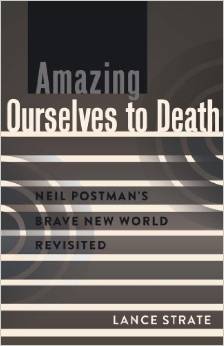 | Amazing Ourselves to Death: Neil Postman's Brave New World Revisited (A Critical Introduction to Media and Communication Theory) Neil Postman’s most popular work, Amusing Ourselves to Death (1985), provided an insightful critique of the effects of television on public discourse in America, arguing that television’s bias towards entertaining content trivializes serious issues and undermines the basis of democratic culture. Lance Strate, who earned his doctorate under Neil Postman and is one of the leading media ecology scholars of our time, re-examines Postman’s arguments, updating his analysis and critique for the twenty-first-century media environment that includes the expansion of television programming via cable and satellite as well as the Internet, the web, social media, and mobile technologies. Integrating Postman’s arguments about television with his critique of technology in general, Strate considers the current state of journalism, politics, religion, and education in American culture. Strate also contextualizes Amusing Ourselves to Death through an examination of Postman’s life and career and the field of media ecology that Postman introduced. This is a book about our prospects for the future, which can only be based on the ways in which we think and talk about the present. |
Escape from the Trap of E-culture: A Study on Neil Postman's Media Theories, by Xioen Wu. Neil Postman’s thought on Media Studies is targeted at the way of media and the trend of the whole social cultures. Drawing from the expression “the medium is the message”, coined by Marshall McLuhan, Dr. Postman developed his theory that "the medium is the metaphor", which holds that each medium dissimulates an undetected ideological bias or behavioral tendency that controls our understanding of the world, and shapes and creates our cognitive world. Dr. Postman’s main concern was the electronic cultures and the critical thinking of epistemology. He looked at the booming electronic media in the post-print era with a serious and critical attitude and put a significant emphasis on the negative effects it has brought to social culture. He also asserted that “information has become a form of garbage” in the age of electronic media. From a humanistic point of view, Dr. Postman warned about the ideology tendency of electronic media technology. He urged the public to resist the authoritarian rule of technology with morality and fraternity. He stood against value neutrality, stressing morality in social research and regarding social research as a branch of moral philosophy. Confronted with the abuses in the age of electronic culture, he proposed that reform on education, with the preservation of the print culture as its aim, should be carried out to counter the electronic culture, so that equilibrium in social culture can be realized. The media theories of Dr. Postman are perceived from his profound knowledge of semantics and long-term research and practice in education, guided by the ideas of McLuhan, inspired by the childhood problem and his attention to the education reform in schools, developed with the research over televised viewing, brought to maturity with the critique of technopoly, and directed back to education research in the end. This book dates back to the origin and development of Media Studies, and examines the people and thought which influenced academic thought and critical thinking, including Alfred Korzybski、Marshall McLuhan、Harold Innis、Lewis Mumford、Michel Foucault、Friedrich August Hayek、the Frankfurt School、Western Marxism、the Chicago school and so on. These figures and schools have laid a solid foundation for the study and media and serve as rich resources for the development of media studies. |
- Amusing Ourselves to Death: Revisiting the Prophetic Work of Neil Postman, by Casey Chalk. Public Discourse 10/09/20.
- Incivility, Anger, New Media and Contemporary Politics, by Matt McManus. Areo Magazine 10/10/19. "[Postman's] point about the flattening of complex political discourse into polarized entertainment is timely. Indeed, it partly explains both the emergence of partisanship and the rampant cynicism in discourse today."
- Are We Having Too Much Fun?, by Megan Garber. The Atlantic 04/27/17. "In 1985, Neil Postman observed an America imprisoned by its own need for amusement. He was, it turns out, extremely prescient."
- My dad predicted Trump in 1985 – it's not Orwell, he warned, it's Brave New World, by Andrew Postman. The Guardian 02/02/17.
- Did Neil Postman Predict the Rise of Trump and Fake News?, by Ed McMenamin. Paste Magazine. 01/04/17. "What We Can Still Learn From His Prophetic Book More Than 30 Years Later."
- Meet the man who predicted Fox News, the Internet, Stephen Colbert and reality TV, by Scott Timberg. Salon.com. 01/04/15. "The most important media observer of our time died a decade ago -- but saw our superficial, silly side taking over."
- Building Bridges or Burning Them?: Revisiting Neil Postman's Building a Bridge to the Eighteenth Century, by Meredith Carroll. 9/20/14. Hastac.org.
- Guest Writer Andrew Postman: Introduction to the 20th Anniversary Edition of Amusing Ourselves to Death by His Dad, Neil Postman
Pressthink January 20, 2006.
- A Tribute to Neil Postman
by Rob Mercer Schuchhardt. The New Pantagruel Winter 2004.
- Neil Postman: Defender of the Word
by Lance Strate. ETC 2004. [PDF format]
- Neil Postman: A civilized man in a century of barbarism by Jay Rosen. Salon.com. Oct. 10, 2003. [subscription required].
- Profile: Neil Postman
from "Nine Pioneers of Mental Environmentalism" Adbusters Nov/Dec. 2001.
- Neil Postman is no Progressive
by Jay Walljasper. Conscious Choice, January 2000.
- Neil Postman's Criticisms of the Television Medium
by Jonathan Goldstein. Student @ University of Wales.
- ETC: 1994 - Post(Modern) Man, or Neil Postman As A Postmodernist
by Lance Strate. Originally presented at the 79th Annual Meeting of the Speech Communication Association in Miami Beach, FL, Nov. 18-21, 1993, as part of a program entitled "Communication, Education, and Culture: Perspectives on the Scholarly Activity of Neil Postman." [PDF format]
- "Amusing Ourselves to Death: Aldous Huxley vs. George Orwell", Postman's words illustrated by Stuart McMillen. (www.recombinantrecords.net)
